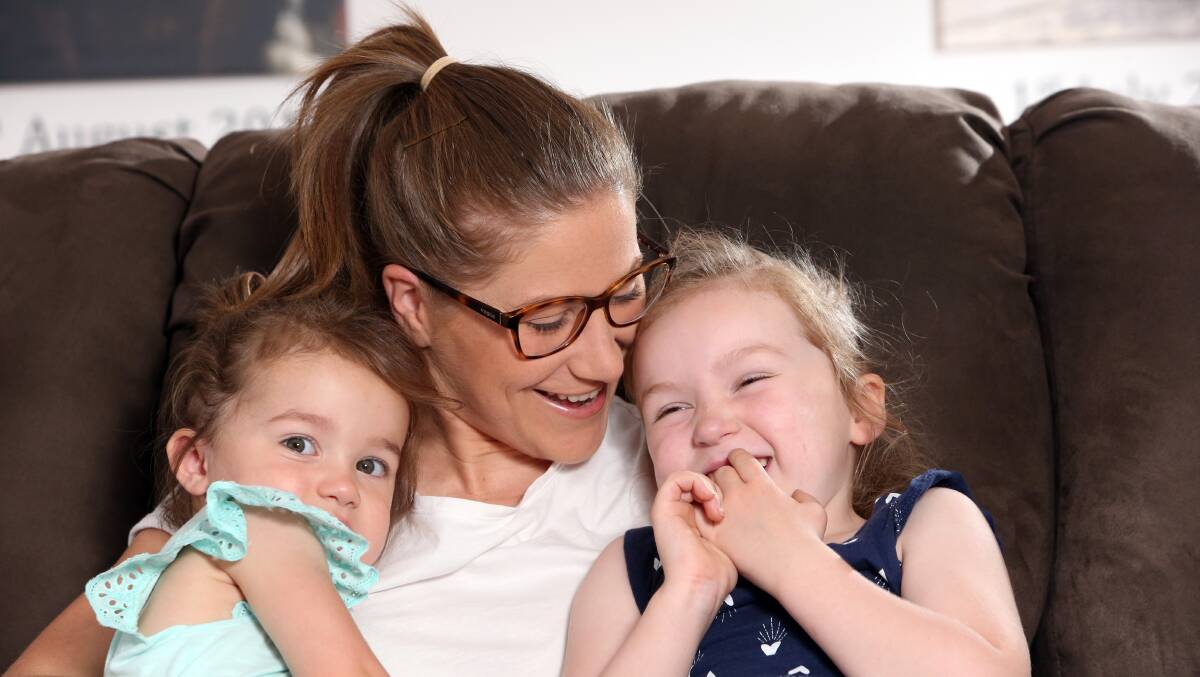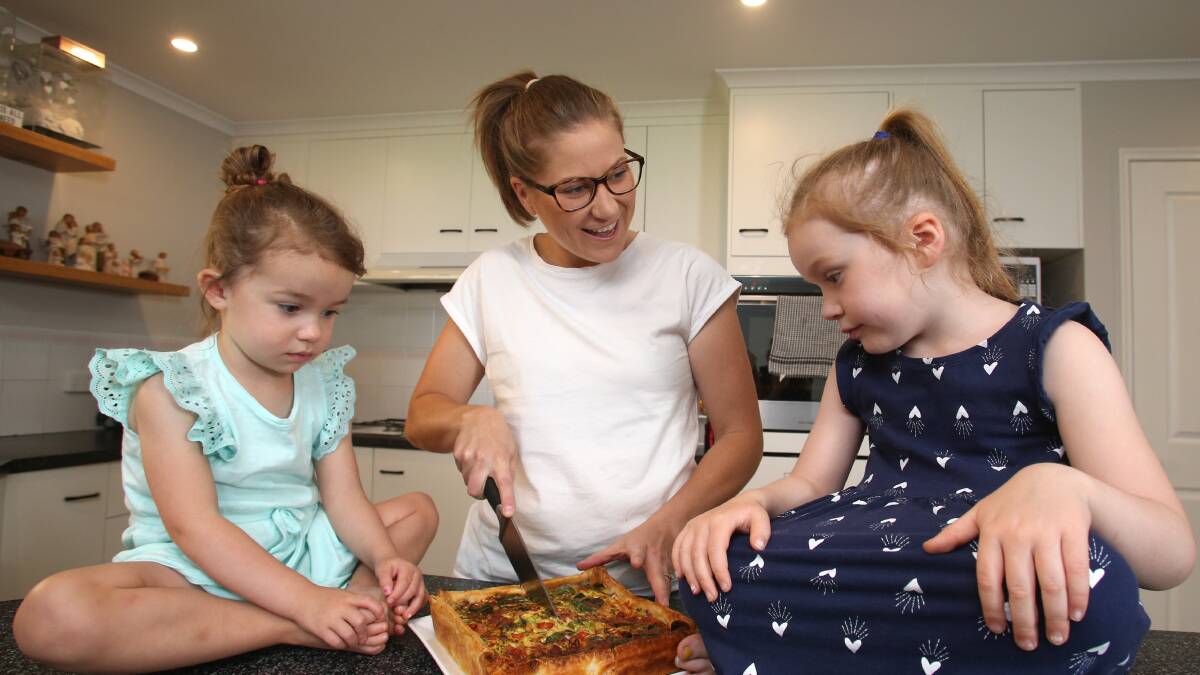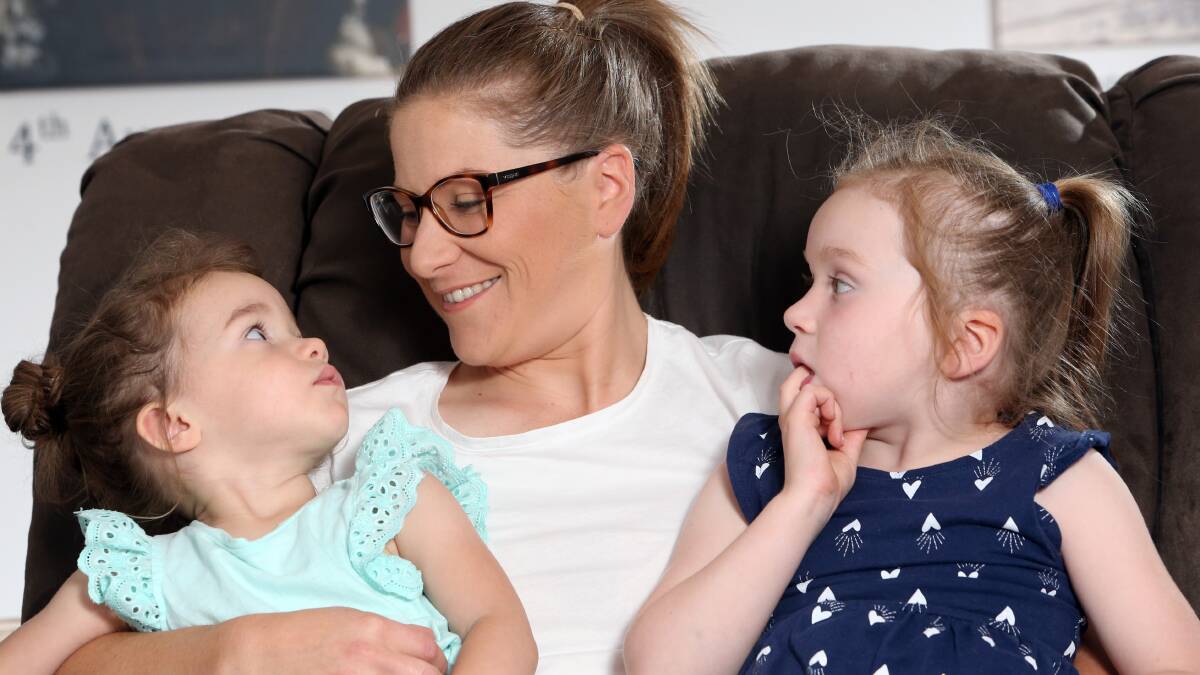
When Julianne Baldock first walked into her oncology ward all she can remember is grey heads turning to look at her and her pregnant belly.
Subscribe now for unlimited access.
$0/
(min cost $0)
or signup to continue reading
Mrs Baldock was 27-years-old and 30 weeks pregnant when she was diagnosed with an aggressive stage two breast cancer.
With husband Carl and daughter Luella, she had picked up the keys to their new Bendigo house just a few weeks earlier.
The lump had come almost from nowhere. By the time Mrs Baldock was diagnosed it was the size of a “cocktail frankfurt”, five, by three, by two centimetres.
The cancer was stage two, with grade three aggression.
“The obstetrician had checked my boobs at 15 weeks pregnant, and there was nothing, so it had come and grown to that big in 15 weeks,” Mrs Baldock said.
“It was ready to kill me”
It began when Mrs Baldock found a lump on her breast. It didn’t feel right, so she showed it to her obstetrician at the next visit. The obstetrician ordered an ultrasound.
At that scan the doctor asked to biopsy the lump. The next day, Mrs Baldock’s obstetrician called.

She asked to see Mrs Baldock that morning – working on the family farm with her father, an hour away, Mrs Baldock asked to see her later – her obstetrician asked if Mrs Baldock could do that afternoon. At that point the penny dropped.
“I said, ‘Just give it to me, hit me with it’, and she did,” Mrs Baldock said.
“I got out crying, and I go, ‘I’ve got breast cancer Dad’. He burst into tears. And then I had to call Carl.
“That’s when the whirlwind started.”
By Monday Mrs Baldock was in Melbourne for treatment. A week later she started chemotherapy.
While pregnant, she had no way of knowing whether the cancer had spread.
Treatment was physically and emotionally hard.
“Every night we’d go to bed in tears just wondering, ‘Is it going to beat me? Am I going to see my girls grow up?’,” Mrs Baldock said.
“What hits me the hardest now is not knowing how hard it was for Carl at the time. He was my rock and he helped me through.
“It wasn’t until we met with [the breast-scan nurse after chemotherapy], and we could have had this service and that service, that I realised how hard it was for Carl, because he didn’t really have anyone to get his side of stuff out.”

Exhaustion was “the biggest” stress. Mrs Baldock was still trying to do every night-time feed of Luella, to save her husband’s energy for his work as an electrician.
“I literally was just a walking zombie. I probably didn’t realise how tired I was until I started to finish radiation, and start to come better again,” she said.
Mrs Baldock had two hits of chemotherapy while pregnant, then delivered baby Ivanna by caesarian section three weeks early, before two more bouts of chemotherapy, surgery, and radiation therapy.
So many decisions were taken out of her hands, and even little things were hard.
For instance, Mrs Baldock couldn’t pick the date her daughter was born, because her bloods had to be right. She couldn’t breastfeed. She can’t have more children.
“We can’t have any more babies, but we didn’t get to make that decision, those sorts of things are very mentally tough,” she said.
Now cancer-free, Mrs Baldock has to take daily and monthly medication, which has put her into an artificially induced menopause.
At just 30-years-old, she is handling symptoms like hot flushes and mood swings.
Her goal is to stay on the medication for five years, but not many people make it that far.
“Emotions are up and down. It depends on the cycle of the injection and everything. It’s pretty tough on everyone now, and the girls as well,” Mrs Baldock said.
“One minute Mummy’s happy and the next minute something triggers me, and I’m a crank.”
Read more: Runners rally for breast cancer research
The medical management of cancer during pregnancy is quite well established, but its psychological effects have not been studied deeply, according to Associate Professor Lesley Stafford, head of clinical psychology at the Centre for Women’s Mental Health.
Cancer affects about one in 1500 pregnancies. From her clinical experience, Associate Professor Stafford knows it’s often a scary time for women, and an isolating one as well.
“These women are really lonely. They feel like outsiders in the chemotherapy ward where they’re the only person who’s pregnant, or then come to the delivery rooms and they’ve got no hair, no eyebrows, no eyelashes," she said.
“It’s an unusual experience, and I think it must be very lonely very frightening. Women worry so much about the effect on the baby.”
Associate Professor Stafford has embarked on a study to collect data from women who have been diagnosed with cancer during a pregnancy.
Feeling alone in an oncology ward was hard for Mrs Baldock. Unable to breastfeed and forced to leave her baby for treatment, it took months to feel like Ivy was her own.
“I was like the youngest by a minimum of 30 plus years. I just remember walking in on my first treatment with this big belly, and all grey hair, that’s all I remember seeing, and all these eyes just turned and looked at you,” Mrs Baldock said.
She recalls the one time she tried to take Ivy in, to show her oncologist.
Just ten days old, Ivy got hungry, and screamed and screamed. Hooked up to chemotherapy, with her own Mum and Dad, who had no experience of bottle-feeding a baby, it was difficult enough.
Then the woman in the bed beside her got angry, and the nurse came in and asked Mrs Baldock to take the child out of the room.
“That hit home, and that really hurt … I never took Ivy again,” Mrs Baldock said.
“Not being able to take my baby, who already didn’t need me. Because I couldn’t breastfeed her, she didn’t need me … The bond with Ivy took about four months before I felt like she was mine.
“I had to just leave her to go and have treatment, and leave her when I had my surgery, and stay overnight without her, and she’s only this little, little baby.”
Not knowing whether she was going to be around for her daughters was one of Mrs Baldock’s biggest fears.
“I can see the girls growing up, but not knowing if I was going to be there with them, and not knowing how Carl was going to cope with two girls by himself,” Mrs Baldock said.
“You really do think the worst. One they’ve said you’ve got the big C word, cancer, you don’t know what’s going to happen.”
It was after her third CT scan came up clear that Mrs Baldock and family decided to throw a party.
“That’s when I said you know what, I have to put an end to this, I’ve beaten it,” she said.
“Because otherwise when do you move forward?”
To participate visit: bit.ly/2Ek0TxC
Have you signed up to the Bendigo Advertiser's daily newsletter and breaking news emails? You can register below and make sure you are up to date with everything that's happening in central Victoria.


